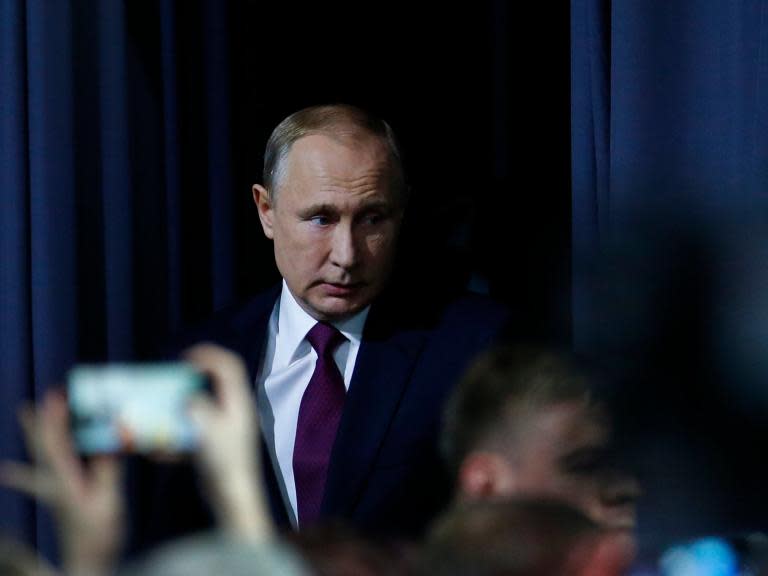Despite growing tensions and cashflow problems, Russia is unlikely to change course in 2019
The year just gone has been a rollercoaster one for Vladimir Putin.
It was not without its sweet moments. In March, he swept to victory in an impressively managed election – securing, just as impressively, a high turnout in the absence of any contest.
In the summer, he oversaw a well-received World Cup, recruiting hundreds of thousands of new foreign ambassadors to Russia’s cause.
And throughout the year, he strengthened his position as the cynic-in-chief of world politics, seeing off longtime rival, German chancellor Angela Merkel in the process.
But the Russian president was less assured when up against the unfamiliar or unforeseen. In these moments, he almost seemed to belong to another century.
It is unlikely that, at the age of 66, Putin will dispense with his mistrust for international order; his anger when he feels his country is not being taken seriously enough; or his capacity for avenging that disrespect
The Kremlin was helpless when the open-source sleuths Bellingcat helped to identify the two military intelligence officers accused of administering novichok in Salisbury. It was irrelevant when the identities of another several hundred were leaked. It tried and failed to block the social messaging app Telegram, apparently misunderstanding the nature of Russia’s internet. And it was unable to contain the backlash from the unpopular changes to the pension age or the resulting four-year lows in Putin’s approval rating.
The looking glass in Russia is rarely clear, and those who claim to see the future through it are usually bogus. That said, we can certainly assume volatility will continue well into 2019.
Much of the Russian system remains highly centralised, driven by the personality of the president – and by what others imagine he wants. It is unlikely that, at the age of 66, Putin will dispense with his mistrust for international order; his anger when he feels his country is not being taken seriously enough; or his capacity for avenging that disrespect.
The incident in Kerch in November, when Russian forces opened fire on a small Ukrainian flotilla attempting to access shared waters, shows a leader still willing to push the boundaries.
Polls may be on the way down, but there is significant resource left in the system, not least in its repressive apparatus
Three other factors add unpredictability to the mix.
First, there seems to be a growing protest sentiment within Russia. The second half of 2018 harboured many warning signs for the regime. In the far-eastern region of Primorye, for example, the Kremlin had to try twice to get their man installed as governor (and even then not without claims of rigging).
Second, the government has run out of easy cash. Russia’s well-managed macroeconomic policy has so far managed to avoid a major crisis despite a serious sanctions regime. But the business climate remains poor, wages are stagnant and growth low – 1.7 per cent according to the president’s own disputed figures.
The president has also announced ambitious plans for infrastructure and social investment. The money for that has to come from somewhere and taxation is likely to increase.
The third factor is the continued importance of the hostile western bogeyman in domestic policy. Russian voters respond well the idea of the country being a besieged fortress, flexing its muscle and, especially, standing up to America. The potential for conflict and further adventure is obvious, though where it may happen is anyone’s guess.
Russia will continue to position itself as a disruptive force, if only because there is little prospect of a positive breakthrough on any of the policy issues it considers important.
Relations with the west are likely to remain terrible, and will probably get worse. There was a time around Donald Trump’s election in November 2016 when the Kremlin privately revelled in its “evil genius” image. Now many consider it to be a problem. In the US and Europe, Russian interests have almost become toxic.
There remain no easy fixes in Syria. The US army may be on the way out – at least partially – handing an even fuller military victory to the Kremlin. But Moscow lacks the resources for the rebuilding phase and is unlikely to get them from the west, and exiting the region will be difficult.
Ukraine, meanwhile, is lost for at least a generation. War has fostered levels of animosity on both sides that will not be easy to fix.
In a non-authoritarian country, domestic and foreign policy impasses such as these could have serious electoral consequences.
In Russia, no one is about to press the panic button. Opinion polls may be on the way down, but there is significant resource left in the system, not least in its repressive apparatus. With a rigged electoral system and heavily controlled information space, there is next to zero prospect for alternative political forces to emerge.
In short, 2019 is most likely to serve up more of the same: A flatlining economy, occasional protest but relative political stability. No miracle. No catastrophe. No plain sailing, but the Putin system, surely, has some life in it yet.

 Yahoo News
Yahoo News 

